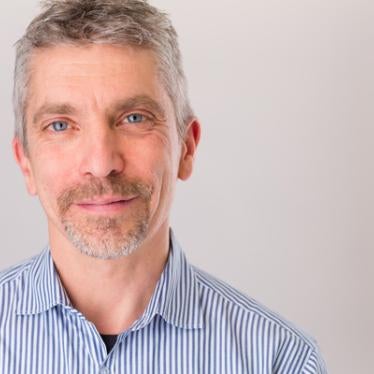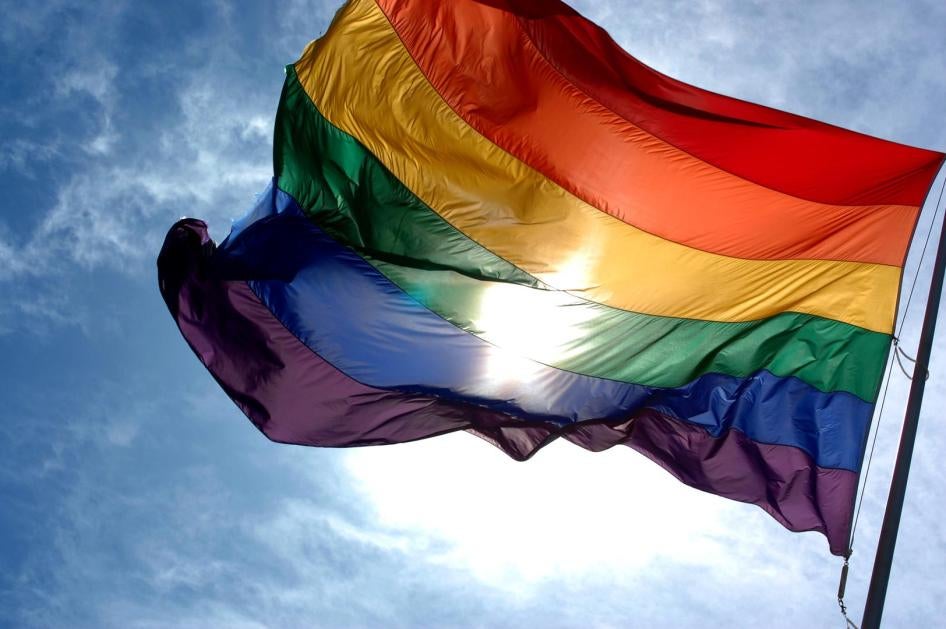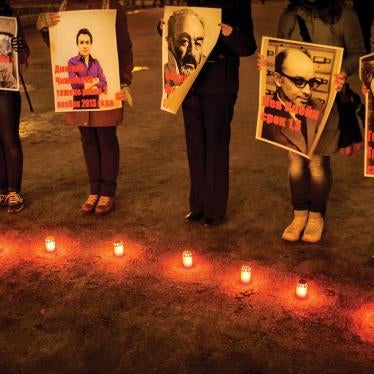The Fletcher Forum interviewed Graeme Reid, the director of Human Rights Watch's Lesbian, Gay, Bisexual, and Transgender Rights Program, in November 2017, following Mr. Reid's participation on a panel discussing 'Queering International Relations' as part of the 2017 Conference on Gender & International Affairs.
Fletcher Forum: What is the role of the LGBT Rights program within Human Rights Watch?
Graeme Reid: The LGBT rights program at Human Rights Watch is a relatively small program of 7 staff members, but we are fortunate that we work in an organization of 450 people working in 90 countries. Human Rights Watch researchers work around the world, keep an eye on LGBT issues, and bring country expertise so we can tackle LGBT issues in a broader country and regional context.
As an example, when there was a purge against gay men in Chechnya, we were very well placed to document the atrocities there, in the face of denial by Chechen authorities. The Russia program director, based in Moscow has been working in Chechnya for 16 years. She has the contacts, the trust of different groups, and was well placed to speak to individuals who were highly traumatized by their experience, to document that, and then use that research to press the international community to put pressure on the Kremlin to take action in Chechnya. That international attention was effective, and the mass incarcerations came to an end. We were also able to highlight the plight of refugees who had fled to Russian cities, and advocate for their resettlement.
Being part of a broad-based human rights organization is also politically appropriate because it means LGBT issues are not addressed in isolation. Given that the main challenge to LGBT rights at the international level, as we see in the disputes at the UN, is whether LGBT rights are human rights at all, this is key. It is important, symbolically and beyond, that a mainstream human rights organization like Human Rights Watch is emphatic and unapologetic about dealing with LGBT rights within a broader human rights agenda.
FF: Can you give us a snapshot of LGBT issues in the world, what is the trend in where things are heading?
GR: I hesitate to talk about trends because I think that we need to usually look at country-specific or sometimes regional-specific issues. But nevertheless, I think it’s a useful question. I think if we look at what’s happening at the UN, we’ve seen rapid progress in terms of the appointment of an independent expert on protection against violence and discrimination based on sexual orientation and gender identity - that has been a significant milestone.
If we look at the process that led to that appointment, we also see a shift in attitudes around the world. In all regions, there has been an increase of support for the various resolutions that led to this appointment. And even though the appointment was subject to extreme opposition, it nevertheless went ahead. So if we look at the meta-level, we see a trend towards greater inclusion and acceptance as well as a growing recognition of the level of discrimination and violence that’s experienced by people on the basis of sexual orientation and gender identity and the need to redress that in some way.
There have been worrying developments internationally which I see in part as a pushback against some of the advances that have been made. My particular concerns are around the proliferation of laws that seek to restrict the so-called ‘promotion’ or ‘propaganda’ of same-sex relations. These laws seek to outlaw the expression of identity. They really go a long way to violate rights of association and expression.
Nigeria is one example. The Same-Sex Marriage (Prohibition) Act passed in 2014, implies that the law is very narrow in focus when actually it is extremely broad. It forbids any public expression of identity or any support of LGBT groups and it comes with a heavy penalty. While the law has not been implemented in any systematic way, it nevertheless sends a very negative message which has an inhibiting effect on LGBT populations, and it also creates a climate in which violence occurs, as our research has documented.
FF: Building on that example of Nigeria and propaganda laws, could you talk about addressing the substance and broader effects of these propaganda laws over its stated anti-LGBT focus.
GR: I could use a number of different examples but given that we were talking about Nigeria, I’ll stick with that. The origin of the law had a lot to do with geopolitics within Sub-Saharan Africa and Nigeria presenting itself as ‘authentically African’ and using the law to distance itself from South Africa, which is portrayed as uncomfortably aligned with the West. Remember that the draft law was introduced soon after the South African Constitutional Court paved the way for same-sex marriage there.
The bill stayed dormant for a long period of time and it only gained momentum when Goodluck Jonathan, who at that time was aspiring to become president of Nigeria again, used this as a way of garnering political support and distracting attention from corruption scandals and the security threat from Boko Haram. A useful ruse at that point was to create a moral panic around a perceived threat to Nigerian sovereignty. Your question is: “well how do we address that?”
In practical terms, what we did was an initial visit to Nigeria shortly after the passage of the Same-Sex Marriage (Prohibition) Act. We met with a number of NGOs including groups that worked on LGBT issues, on health issues, on women’s rights, broader human rights organizations, a number of different players and discussed what would be an effective way of talking about the impact of the law.
In the end, we focused on the impact of the law on freedoms of expression and association, and also on the issue of violence because we learned that not only had there been an increase in the level of violence, but that LGBT community members felt utterly disempowered from reporting any form of crime or violence to the police. Our report exposed the extremely negative consequence of the law — which has got nothing whatsoever to do with same-sex marriage.
FF: You have written about countries like Russia using “the defense of traditional values” as a wedge issue, at the UN and elsewhere, against human rights. Can you talk about how that plays out in practice?
GR: The propaganda law does political work in Russia for Putin by helping to consolidate his conservative support base. By clamping down on LGBT rights, Putin presents himself as the defender of ‘traditional values’ against his more urban and cosmopolitan opposition.
But that was only part of the story. Internationally, Russia increasingly took on the mantle of traditional values. This was used as a wedge issue for those former territories of the Soviet Union that had aspirations to join the European Union and those who were being pressured or persuaded to join the Eurasian Customs Union. The LGBT issue was very explicitly deployed as a wedge issue that caricatured the West as being hedonistic and overly permissive, and to cast the human rights conditions of EU membership in a negative light.
Russia uses ‘traditional values’ to forge and consolidate alliances with other states at the UN. The Organization of the Islamic Conference and the Africa Group consistently speak in the language of traditional values. Propaganda laws, and their equivalents have been discussed extensively in Eastern Europe and much further afield, including Nigeria, Uganda, and Egypt.
FF: The Trump administration is taking a different line than the Obama administration on these issues. How does the US taking a step backwards affect your work, and how do you see it impacting the organizations and communities you’re working with?
GR: Since Hillary Clinton’s ‘gay rights are human rights, human rights are gay rights’ speech at the UN Human Rights Council, and Barack Obama’s memorandum, LGBT rights became an explicit part of US foreign policy.
This combination of political cover and material support meant that internationally, a number of groups have been emboldened to be more visible and vocal. The withdrawal of political support and the rise of populist and autocratic leaders internationally, leaves LGBT groups exposed, and because they are more visible they are also more vulnerable.
That is not to say that it is an entirely black and white picture. Nikki Haley has spoken out against the atrocities in Chechnya. The US has supported the wording of the Olympic Truce inclusive of sexual orientation. Recently, there was a controversy about the US not signing the death penalty resolution that for the first time explicitly mentions sexual orientation, although the back story is that the US doesn't support the resolution and it never has because of the death penalty, not because of the LGBT issue. In fact, the U.S. delegation strongly pushed for the inclusion of sexual orientation in that resolution. But overall, the Trump administration has had a very negative impact because it has put the wind in the sails of social conservatives and autocrats internationally who feel like they can get away with human rights abuses in general and abuses against LGBT people specifically.
FF: If the US is taking a step backwards, what countries are filling in the gap?
GR: Canada has been exemplary, not only in the advances they have made domestically but stepping up internationally. I also want to emphasize the strong role of Latin American states that have not only made advances domestically, but have also played an increasingly prominent international role. We’ve seen that both in the core group of LGBT-friendly states at the UN and also the strong representation of Latin American states in the Equal Rights Coalition, a broad network of states that seek to support the rights of LGBT people internationally.
FF: One observation of the panel at the Gender Conference was that as LGBT groups grow, and become more visible there is a backlash that rises to meet it; and outside organizations offering support, can be seen as an unwanted outside or even colonial influence. What do you think about this concern, and how has your organization experienced it?
GR: I am cautious about the word “backlash” because it implies an automatic response, and that can disguise the real organization of opposition. Opposition groups are also social movements, that are well resourced, increasingly sophisticated, and operating in a lot of different spheres.
As an organization operating globally, we are meticulous about working with credible in-country organizations, and seeking guidance from local LGBT leaders or, in the absence of an LGBT organization, a human rights organization, about what would be useful and what would be harmful.
FF: In the spirit of the Gender Conference, what is something you would want foreign policy thinkers and practitioners to change about how they think about LGBT issues?
GR: I think the one thing is not to treat LGBT rights issues as a side issue, because it is often symptomatic of the broader human rights situation in a particular country. If there is a clampdown on LGBT people, it is almost inevitable that there is going to be a clampdown on civil society writ large. If you let that go, ignore it, don’t pay enough attention to it, you can be sure down the line there are going to be other human rights abuses that take place. It needs to be confronted very directly, and not seen as a secondary issue.








